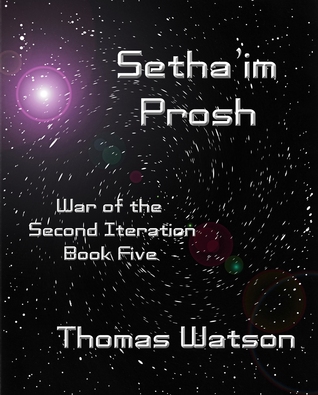- Bible
- Read the Bible
- Bible Versions
- Verse of the Day
- Reading Plans
- Verses by Topic
- Books of the Bible
- Bible Images
- Study
- Commentaries
- Concordances
- Dictionaries
- Encyclopedias
- Sermons
- Bible Atlas & Maps
- BP Wiki
- Devotionals
- Today's Devotionals
- Light of the World
- All Devotionals
- Inspirational Quotes
- More
- Picture Quotes
- Videos
- Inspirational
- Bible Study
- What The Bible Says
- Bible Q&As
- Daily Bread
- Bible by Genre
- Bible Stories
- Random Bible Verse
- Community
- Store
Setha'im Prosh: War of the Second Iteration, Book Five
by Thomas Watson
Book Five of Five.
The Faceless have come, waging total war against the Republic and the Confederation of Clans. As star systems fall and a desperate effort is made to find out who and what the Faceless really are, foes must become allies against the common threat. If their defenses do not hold, nothing will prevent the Faceless from invading the Commonwealth. And with the resources of the Commonwealth under their control, no power in the galaxy, not even the strange and alien T'lack, will be able to stop the Faceless from exterminating Humanity and its allies.
Robert MacGregor and his family prepare for the worst, both hoping and fearing that this will be the end of the madness. Hoping and fearing, for all wars eventually end - one way or another.
The Faceless have come, waging total war against the Republic and the Confederation of Clans. As star systems fall and a desperate effort is made to find out who and what the Faceless really are, foes must become allies against the common threat. If their defenses do not hold, nothing will prevent the Faceless from invading the Commonwealth. And with the resources of the Commonwealth under their control, no power in the galaxy, not even the strange and alien T'lack, will be able to stop the Faceless from exterminating Humanity and its allies.
Robert MacGregor and his family prepare for the worst, both hoping and fearing that this will be the end of the madness. Hoping and fearing, for all wars eventually end - one way or another.
BUY NOW
ebook
Published June 16th 2016 by Smashwords Edition
© 2025 Bibleportal.com All rights reserved.

He was educated at Emmanuel College, Cambridge, where he was noted for remarkably intense study. In 1646 he commenced a sixteen year pastorate at St. Stephen's, Walbrook. He showed strong Presbyterian views during the civil war, with, however, an attachment to the king, and in 1651 he was imprisoned briefly with some other ministers for his share in Christopher Love's plot to recall Charles II of England.
He was released on 30 June 1652, and was formally reinstated as vicar of St. Stephen's Walbrook. He obtained great fame and popularity as a preacher until the Restoration, when he was ejected for nonconformity. Not withstanding the rigor of the acts against dissenters, Watson continued to exercise his ministry privately as he found opportunity. Upon the Declaration of Indulgence in 1672 he obtained a license to preach at the great hall in Crosby House. After preaching there for several years, his health gave way, and he retired to Barnston, Essex, where he died suddenly while praying in secret. He was buried on 28 July 1686.
Thomas Watson was an English, non-conformist, Puritan preacher and author.
He was educated at Emmanuel College, Cambridge, where he was noted for remarkably intense study. In 1646 he commenced a sixteen year pastorate at St. Stephen's, Walbrook. He showed strong Presbyterian views during the civil war, with, however, an attachment to the king, and in 1651 he was imprisoned briefly with some other ministers for his share in Christopher Love's plot to recall Charles II of England.
He was released on 30 June 1652, and was formally reinstated as vicar of St. Stephen's Walbrook. He obtained great fame and popularity as a preacher until the Restoration, when he was ejected for nonconformity. Not withstanding the rigor of the acts against dissenters, Watson continued to exercise his ministry privately as he found opportunity. Upon the Declaration of Indulgence in 1672 he obtained a license to preach at the great hall in Crosby House. After preaching there for several years, his health gave way, and he retired to Barnston, Essex, where he died suddenly while praying in secret. He was buried on 28 July 1686.
... Show more